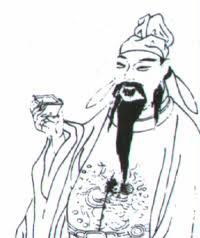 |
Li Po 701 -762. (also known as Li Bai) was a major Chinese poet who belonged to the golden age of classical Chinese poetry during the Tang dynasty. His poetry could be classed in the Chinese Huaigu genre of celebrating the past. But Li Po’s poetry also has a generous free-spirit, celebrating unorthodox perceptions of life. |
Life of Li Po
“You ask me why I dwell in the green mountain;
I smile and make no reply for my heart is free of care.
As the peach-blossom flows down stream
and is gone into the unknown,
I have a world apart that is not among men.”
– Li Po
Li Po was probably the greatest Chinese poets of pre-modern times. It is generally agreed that he and Tu Fu raised the shih form to its highest level of power and expressiveness; later poets at times approached but never surpassed them.
Li Po’s distinction lies in the fact that he brought an unparalleled grace and eloquence to his treatment of the traditional themes, a flow and grandeur that lift his work far above mere imitation of the past. Another characteristic of his poetry is the air of playfulness, hyperbole and outright fantasy that infuses much of it.
All the birds have flown up and gone;
A lonely cloud floats leisurely by.
We never tire of looking at each other –
Only the mountain and I.
– Li Po
Li Po grew up in Szechwan in western China and later travelled extensively in the eastern and central regions. Around 742 he gained recognition from emperor Hsuan-tsung (Xuan Zong) and was appointed to a post in the Hanlin Academy, but a few years later he was exiled from the capital as a result of slanders. He fled south at the time of the rebellion in 755 and entered the service of Prince Yung. The Prince’s downfall involved Li Po in a second exile, though he was eventually pardoned and resumed his life of wandering.
Li Po Poems
